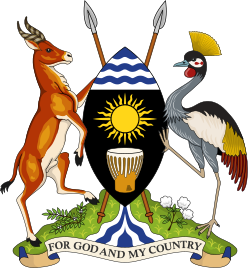| President of the Republic of Uganda | |
|---|---|
 Presidential Standard | |
| Type | Head of state Head of government |
| Residence | State House, Entebbe |
| Term length | Five years, no term limits |
| Constituting instrument | Constitution of Uganda (1995) |
| Precursor | Queen of Uganda |
| Formation | 9 October 1963 |
| First holder | Kabaka Sir Edward Muteesa |
| Deputy | Vice President |
| Salary | USh 33,600,000 / US$9,130 annually [1] |
| Website | statehouse |
 |
|---|
The president of the Republic of Uganda is the head of state and the head of government of Uganda. The president leads the executive branch of the government of Uganda and is the commander-in-chief of the Uganda People's Defence Force. [2]
